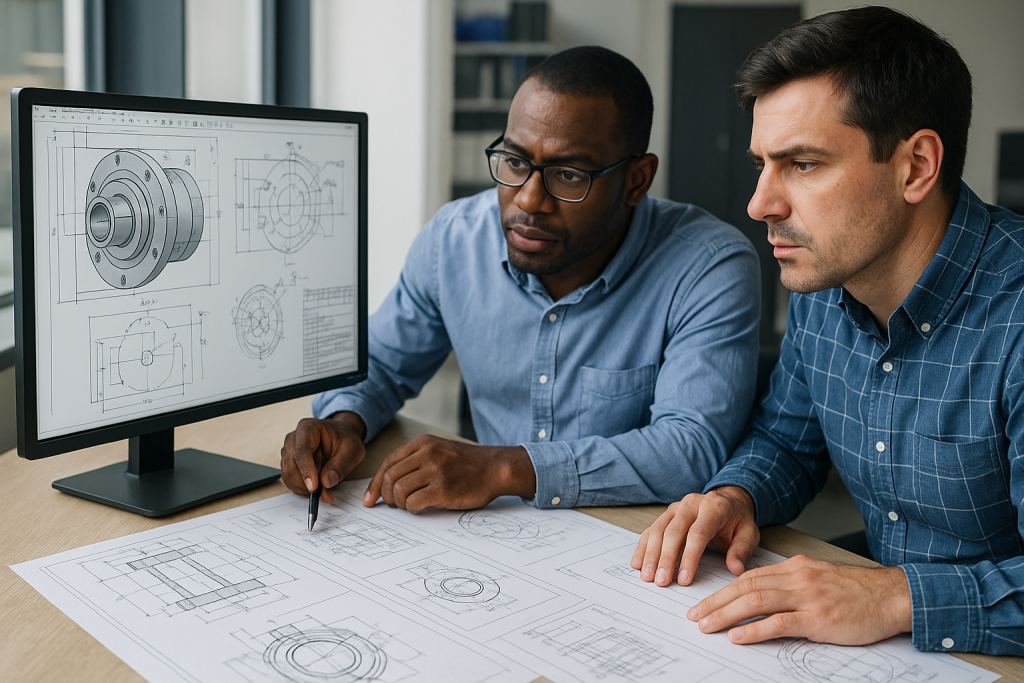
In the rapidly evolving automotive industry, custom car parts are becoming increasingly important — not just for performance tuning, but also for restoration, personalization, and prototype testing. CNC machining (Computer Numerical Control) has revolutionized how these parts are manufactured, enabling precise, repeatable, and cost-effective production of metal and plastic components.
Whether you’re an engineer, designer, or car enthusiast, this guide will walk you through everything you need to know about CNC machining for custom auto parts, with insights from Boona Prototypes — a trusted name in rapid prototyping and precision machining services.
🔧 What is CNC Machining?
CNC machining is a subtractive manufacturing process where raw material is removed from a workpiece using computer-controlled tools. It’s ideal for both prototypes and high-performance custom parts due to its accuracy, flexibility, and compatibility with various materials.
🚗 Why Use CNC Machining for Custom Car Parts?
| Benefits | Description |
|---|---|
| High Precision | Produces components with tolerances as tight as ±0.005 mm |
| Wide Material Selection | Works with aluminum, steel, titanium, brass, plastics, and more |
| Rapid Turnaround | Parts can be produced in 2–7 days |
| Ideal for Low-Volume Runs | No need for expensive molds or dies |
| Consistency and Repeatability | Perfect for matching specifications in performance cars or restorations |
At Boona Prototypes, CNC machined parts are delivered with tight tolerance control, using state-of-the-art 3-axis to 5-axis machines, ensuring precision and consistency for every part — from engine housings to suspension mounts.
🧱 Materials for CNC Car Parts
Choosing the right material is key to ensuring your part performs well under mechanical stress, heat, and corrosion.
| Material | Best For | Properties |
|---|---|---|
| Aluminum 6061 | Engine blocks, brackets | Lightweight, corrosion-resistant, machinable |
| Stainless Steel 304 | Exhaust systems, fasteners | High strength, heat resistance |
| Brass | Electrical connectors, bushings | Non-magnetic, corrosion-resistant |
| Nylon/PA6 | Interior trim, cable guides | Tough, wear-resistant |
| PEEK | High-performance bushings | Chemically resistant, heat-resistant |
Boona Prototypes supports over 30 engineering-grade materials in both metal and plastic CNC machining, giving customers flexibility for both under-the-hood and aesthetic applications.
👉 Learn more about CNC Material Options at Boona Prototypes.
⚙️ Types of CNC Machining Processes
| Process | Applications | Machine Types |
|---|---|---|
| CNC Milling | Gear housings, transmission cases | 3-axis, 5-axis milling |
| CNC Turning | Shafts, spacers, threaded rods | Lathe machines |
| EDM Machining | Complex internal profiles | Electrical Discharge Machines |
| Drilling/Tapping | Mounting holes, screw threads | Multi-tool setups |
Boona Prototypes offers 5-axis CNC machining for complex parts with intricate geometries that would be difficult to produce with conventional methods.
📌 See the advanced CNC machining capabilities here.
🛠️ Tolerance and Finish Options
| Parameter | Range |
|---|---|
| General Tolerance | ±0.1 mm |
| Tight Tolerance | ±0.01 mm (on request) |
| Surface Finish Options | As-machined, Anodized, Powder Coated |
Boona Prototypes adheres to ISO 2768-MK standards for general machining tolerances and provides inspection reports with full quality control on demand.
🧩 CNC Car Parts You Can Manufacture
From performance to restoration, here are some common car parts CNC machining can create:
-
Engine components: Cylinder heads, valve covers, intake manifolds
-
Suspension parts: Control arms, mounting brackets, bushings
-
Drivetrain: Custom gearboxes, flanges, adapter plates
-
Interior mods: Dash knobs, custom AC vents, trim bezels
-
Racing parts: Weight-reduction brackets, turbo manifolds, heat shields
Boona’s in-house engineers work with CAD files like STEP, IGES, and STL, and even offer design-for-manufacturing (DFM) assistance to optimize parts before cutting begins.
💡 Best Practices for CNC Part Design
| Design Tip | Why It Matters |
|---|---|
| Add fillets to inner corners | Prevent tool stress and breakage |
| Avoid unnecessary tight tolerances | Reduces cost and machining complexity |
| Maintain wall thickness > 1 mm | Ensures part integrity and ease of machining |
| Optimize hole depths | Avoid long drills which cause deviation |
Check out Boona’s Rapid Prototyping Services for full design-to-production workflows.
🏁 Case Study: Custom Gearbox Housing for Race Car
-
Material: Aluminum 7075-T6
-
Tolerance: ±0.02 mm
-
Cycle Time: 4 days
-
Features: Internal oil channels, weight-reduction pockets
-
Outcome: 42% lighter than cast equivalent; improved drivetrain cooling
This custom job used 5-axis CNC milling with multiple setups, vibration-resistant fixturing, and CMM inspection before delivery.
🏆 Why Choose Boona Prototypes for CNC Custom Car Parts?
✅ ISO 9001 Certified
✅ Real-time quotation in hours
✅ Global shipping within 2–7 days
✅ Advanced DFM & CAD/CAM support
👉 Visit the official CNC Machining Services page to request a quote or consult Boona’s expert engineering team.
🚀 Future of CNC Machining in Automotive
-
Integration with AI-driven toolpath optimization
-
Hybrid CNC + 3D printing for structural + lightweighting
-
Real-time quality feedback systems
-
Use of STEP-NC standards for smarter manufacturing
📌 Final Thoughts
CNC machining is the go-to method for fabricating custom car parts with high strength, exact fit, and speed. From prototype to performance, it offers unmatched versatility for the automotive world.
If you’re ready to turn your CAD model into a reality, Boona Prototypes is your trusted partner in high-precision CNC manufacturing.
FAQs
1. What is CNC machining and why is it used for car parts?
CNC machining is a subtractive manufacturing process that uses computer-controlled tools to cut and shape materials like aluminum, steel, and plastic. It is widely used for custom car parts due to its high precision, repeatability, and ability to produce complex shapes quickly without the need for molds or tooling.
2. What types of custom car parts can be made with CNC machining?
CNC machining is suitable for producing:
-
Engine blocks, valve covers, and intake manifolds
-
Transmission housings and gearbox flanges
-
Suspension brackets and control arms
-
Dashboard components and interior trim
-
Custom racing accessories and mounts
Check out Boona Prototypes’ CNC machining capabilities for examples of automotive components.
3. What materials are best for CNC car parts?
Popular materials include:
-
Aluminum (6061, 7075) – lightweight and corrosion-resistant
-
Stainless steel – strong and heat-resistant
-
Brass and copper – ideal for connectors and bushings
-
Plastics (Nylon, PEEK, ABS) – for interior and lightweight parts
Boona Prototypes offers over 30+ materials for CNC projects.
4. How accurate is CNC machining?
Boona Prototypes achieves tolerances as tight as ±0.01 mm on request, with general tolerances based on ISO 2768-MK standards. This level of precision ensures that car parts fit and function exactly as designed.
5. How long does it take to make a custom CNC car part?
Production timelines typically range from 2 to 7 business days, depending on:
-
Part complexity
-
Material availability
-
Surface finishing requirements
Boona offers rapid prototyping and low-volume production with global delivery options.
6. Is CNC machining suitable for one-off or low-volume car parts?
Yes. Unlike injection molding or casting, CNC machining doesn’t require expensive tooling. This makes it ideal for:
-
Single-unit builds
-
Prototypes
-
Low-volume production for niche or aftermarket car parts
7. Can Boona Prototypes help with part design?
Yes. Boona offers DFM (Design for Manufacturability) support to help clients optimize their 3D models before production. They accept most CAD formats (STEP, IGES, STL) and assist with tolerance advice, material selection, and machining feasibility.
8. What finishing options are available for CNC car parts?
Boona Prototypes provides:
-
As-machined finish
-
Anodizing (Type II/III)
-
Powder coating
-
Polishing
-
Custom coatings (upon request)
Surface finishing helps improve both appearance and durability, especially for exterior or high-performance parts.
9. What certifications does Boona Prototypes have?
Boona Prototypes is ISO 9001 certified, ensuring strict quality control and traceability for every order. They also offer inspection reports, CMM testing, and material certifications on request.
10. How do I get a quote for my CNC car part?
You can upload your design file (STEP, STL, IGES, etc.) directly to Boona Prototypes’ instant quote system or contact their engineering team for a free consultation.



